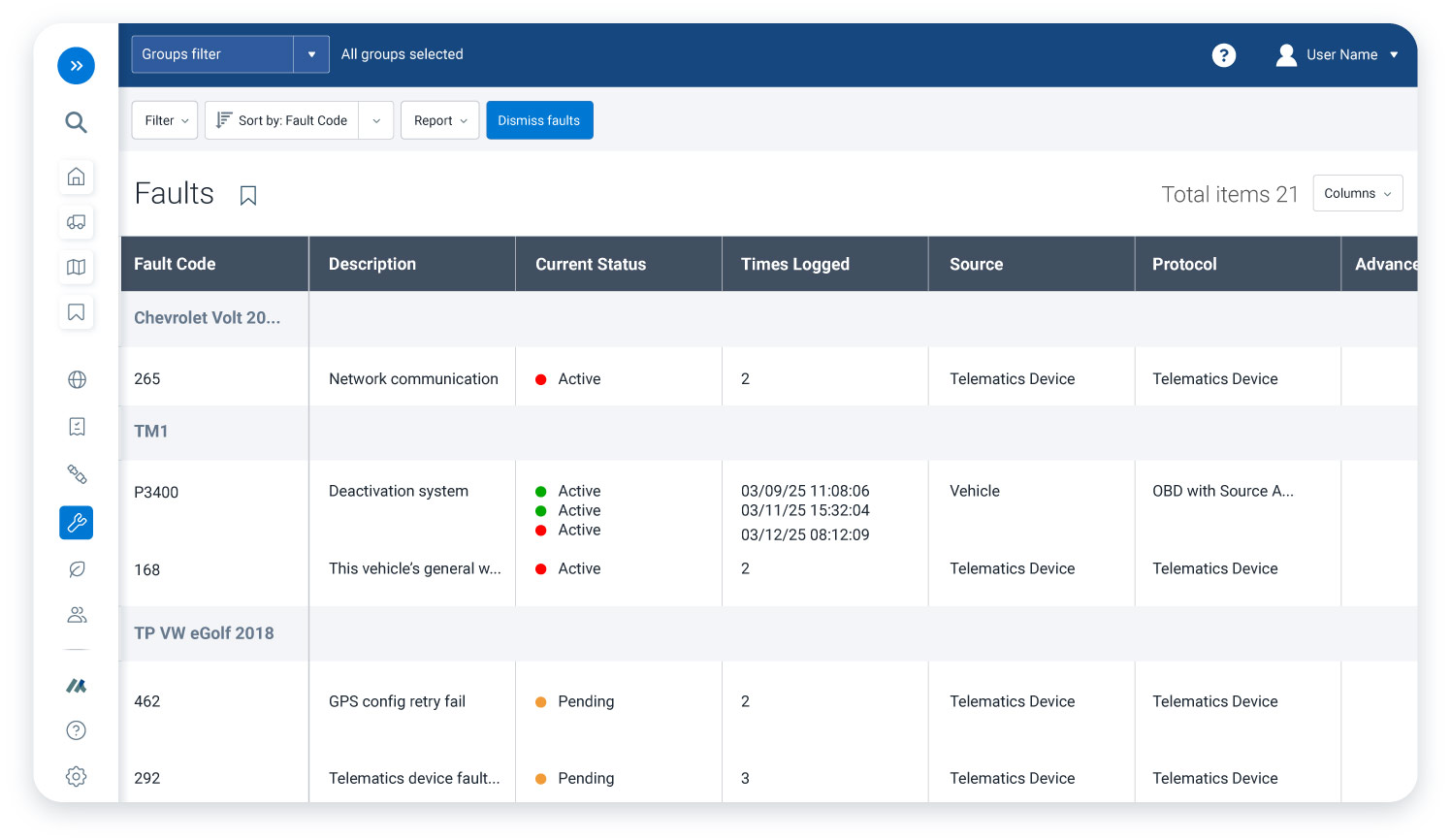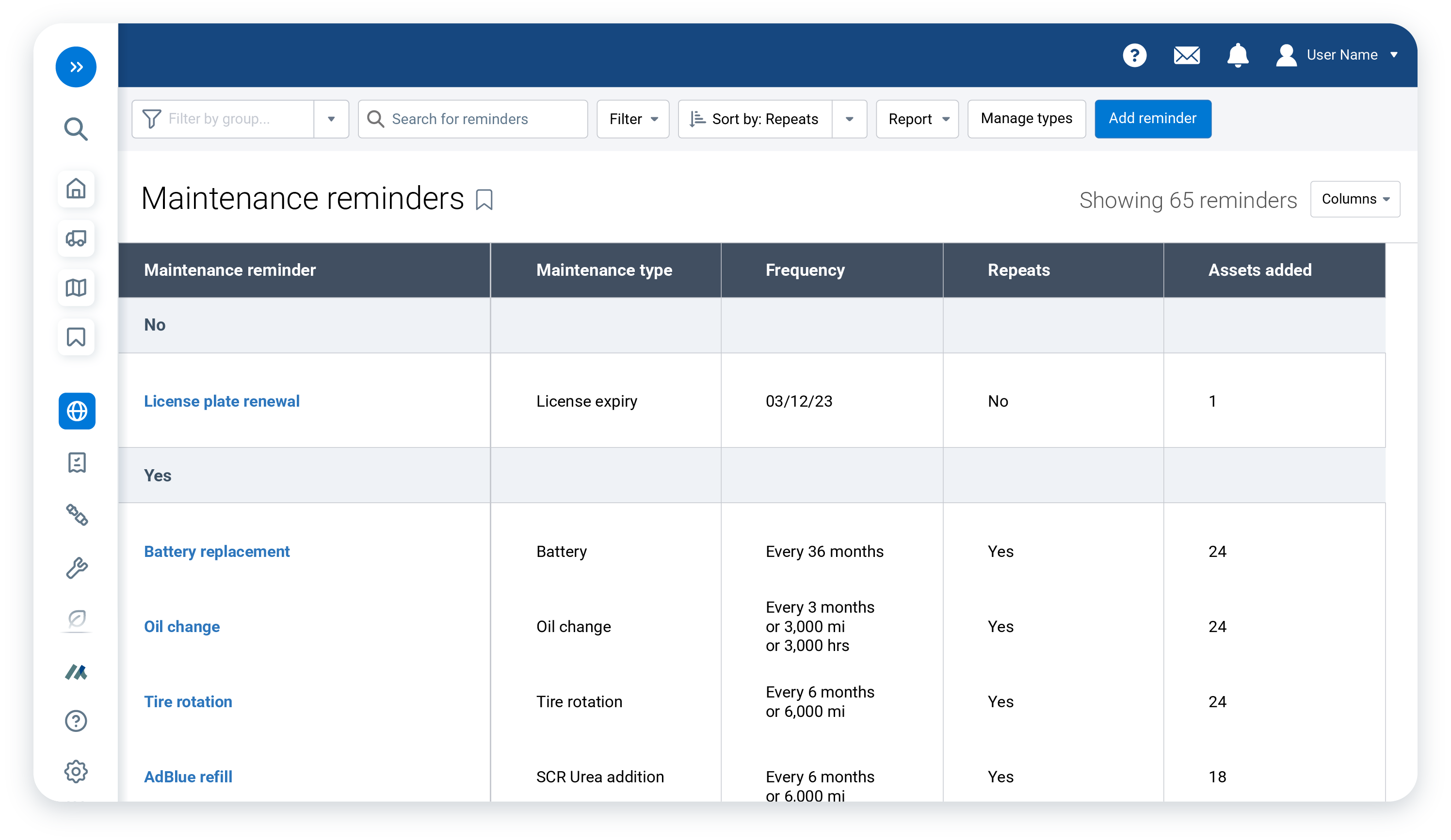The impact of unproductive idling on police vehicle service life
Explore how reducing unnecessary police vehicle idling extends engine life, lowers maintenance costs and keeps your fleet mission-ready while saving on fuel.
By Geotab Team
Jun 10, 2025

Key Insights
- Learn how excessive idling in police vehicles causes significant engine wear, leading to shorter vehicle lifespans, increased maintenance costs and reduced operational readiness.
- Discover how Geotab's fleet management solutions help law enforcement agencies track idling patterns, enforce anti-idling policies and maintain vehicles proactively for significant reductions in idle time.
Police vehicles face unique challenges that accelerate wear-and-tear compared to standard fleet vehicles. Serving as mobile offices ready for immediate action, while experiencing frequent stationary operation, puts extraordinary stress on these vehicles, which can substantially degrade engine conditions and shorten their lifespans over time.
Excessive idling stands out as a major contributor to premature engine deterioration. However, not all idling scenarios are equal - some are unavoidable parts of police operations, while others present opportunities for improved efficiency. For example, idling during active traffic patrol is necessary, but leaving an engine running while completing tasks within close proximity to a district office represents avoidable idling.
This blog post explores why reducing unproductive idling in your police fleet is key to improving operational efficiency and controlling costs and how Geotab can help.
Why is it crucial to limit unproductive police vehicle idling?
Unproductive idling can harm your department’s vehicles and overall budget, making it vital to minimize it as much as you can. Below, we’ve provided several reasons why curbing wasteful idling is a must for your police department.
- Extending engine life: Unproductive idling can substantially reduce police vehicle service life over time. Cumulative wear dramatically shortens engine durability, leading to more frequent overhauls or complete engine replacements.
- Rising car repair costs: Extended engine idling deposits harmful residues that deteriorate engine parts, resulting in increased long-term maintenance expenses. Over time, this can lead to expensive repairs or engine replacement costs that could range from $2,000-$10,000.
- Responsibly using public funds: Well-maintained vehicles with fewer idle hours tend to have lower operational costs. Optimized vehicle usage and maintenance helps you use public dollars more effectively, while preserving the long-term value of your police fleet.
- Minimizing total cost of ownership (TCO): Police vehicles that idle less than others accumulate fewer engine hours and don’t usually need oil changes as frequently. This results in decreased maintenance expenses and a lower overall ownership cost that is more in line with actual mileage (versus engine hours).
How to reduce unproductive idling during daily law enforcement operations
An important step in reducing unproductive idling is clearly defining what qualifies as unnecessary—such as running the engine while parked outside a station without operational need—so officers understand what’s acceptable and what can be avoided. With clear guidelines in place, your department can implement policies that discourage idling near district buildings and encourage officers to complete administrative tasks (like report writing or record checks) inside, where the engine doesn’t need to remain running.
Geotab’s fleet management solution empowers law enforcement agencies to track idling trends using advanced fuel management features that provide detailed vehicle-level reporting. These insights help pinpoint patterns of excessive idling and identify opportunities for improvement.
For example, you can track month-over-month vehicle idling trends through Geotab’s rich reporting capabilities. See if your police fleet’s idling habits are declining as a result of new data-driven policies you’ve installed:
Complementing this, Geotab’s maintenance solution empowers agencies to set vehicle-specific service schedules, triage maintenance issues by severity and streamline work order management, creating a centralized, efficient approach to police fleet upkeep.
Extending police vehicle engine life with Geotab’s fleet maintenance and fuel management tools
Geotab’s fleet maintenance and fuel management tools are powerful allies in extending the engine life of police vehicles, assets that endure some of the harshest driving conditions. Geotab’s fuel management features directly address this by enabling departments to monitor and reduce unproductive idling, ultimately lowering operating costs and prolonging engine health. With Geotab’s deep engine diagnostics, a key differentiator among fleet solutions, agencies gain real-time visibility into vehicle fault codes, engine performance and health insights, enabling proactive maintenance. These capabilities act as a force multiplier by tackling critical factors that diminish vehicle reliability, from fuel inefficiencies to unnoticed mechanical issues.
MyGeotab’s Faults dashboard enables you to study each of the various fault codes picked up by your police vehicles’ hardware devices. Actively monitor vehicle issues with descriptions, current statuses, logged times, sources and more to know when it’s time to administer maintenance:

Additionally, MyGeotab’s maintenance reminders dashboard helps you keep tabs on your police vehicles’ various service needs and schedules. Use data-driven maintenance to avoid missed service, optimize engine health and help your department’s budget go further:

Through the MyGeotab platform, custom rules and alerts can also be easily set up to notify fleet managers when excessive idling occurs, spurring near real-time action. The fuel management page provides detailed idling data down to the individual vehicle level, helping departments curb fuel consumption and prevent premature engine deterioration.
Did you know? By using Geotab’s tools, Peel Regional Police reduced vehicle idling from 250 hours per day to just 50 (an 80% reduction).
Reducing vehicle idling and costs in police fleet management with Geotab
By eliminating unnecessary idling and optimizing maintenance schedules with Geotab's law enforcement-specific solutions, departments can transform fleet data into actionable insights tailored to their unique challenges. As a trusted partner for law enforcement agencies, Geotab's telematics solutions enhance operational excellence while supporting long-term success and budget goals by extending engine life, reducing costs and maximizing mission readiness.
Ready to see how Geotab can help you? Reach out to us today to explore how Geotab's police fleet management solution can help you extend vehicle lifespans and reduce fuel waste.
Subscribe to get industry tips and insights
Frequently Asked Questions
Implementing Geotab for a police fleet can lead to significant long-term savings and operational improvements, including reduced fuel consumption, lower maintenance costs and enhanced safety. By optimizing fleet operations, streamlining workflows and improving resource allocation, Geotab can also boost overall efficiency and enable data-driven decision-making.
Geotab's data helps promote anti-idling policies and compliance by providing real-time visibility into vehicle activity, including idling time and enabling the creation of custom rules and reports to monitor vehicle status. This allows for targeted training and feedback for drivers, reducing idling and improving fuel efficiency.
Geotab helps extend police fleet engine lifespans by providing data-driven insights to enable proactive maintenance, reduce idling and improve driver behavior. This leads to fewer breakdowns, lower maintenance costs and increased engine longevity.
The Geotab Team write about company news.
Table of Contents
- Why is it crucial to limit unproductive police vehicle idling?
- How to reduce unproductive idling during daily law enforcement operations
- Extending police vehicle engine life with Geotab’s fleet maintenance and fuel management tools
- Reducing vehicle idling and costs in police fleet management with Geotab
Subscribe to get industry tips and insights
Related posts

How to stop wasting mechanic hours on ‘ghost codes’ and low-priority repairs
February 2, 2026
2 minute read


Telematics trends for 2026: What is changing and how fleets can respond
January 30, 2026
6 minute read
Fleet GPS tracking systems cost: Full price breakdown and ways to boost ROI
January 30, 2026
6 minute read

Fleet operations: Key components, benefits and challenges
January 7, 2026
4 minute read

Collision avoidance systems: How fleets prevent incidents and improve safety
December 23, 2025
5 minute read